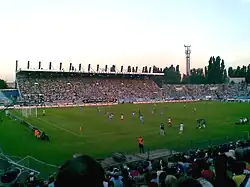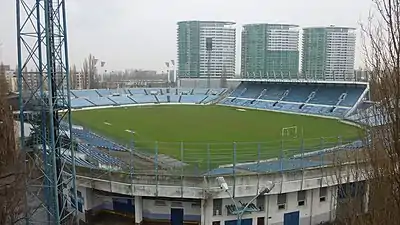Tehelné pole (1939)
Tehelné pole was a neighborhood in Bratislava, Slovakia, characterized by the presence of several sports facilities. Administratively, the neighborhood belongs to Nové Mesto borough, situated around 5 km north-east of the centre. The German and Hungarian names for this locality are Ziegelfeld and Téglamező.
 | |
| Former names |
|
|---|---|
| Location | Bratislava, Slovakia |
| Coordinates | 48°9′48.81″N 17°8′12.68″E |
| Capacity | 30,000 |
| Record attendance | 70,000 (Czechoslovakia–Yugoslavia, 18 May 1957[1] |
| Field size | 105 x 68 m |
| Construction | |
| Built | 1939 |
| Opened | September 27, 1940 |
| Renovated | 1961, 1990 |
| Expanded | 1955, 1961 |
| Closed | 25 November 2009 |
| Demolished | 2013 |
| Construction cost | 8 million SKK[2] |
| Architect | Kamil Gross |
| Tenants | |
| Slovan Bratislava (1940–2009) Slovakia national football team (1996–2009) | |
Football
Most commonly, the name refers to the football stadium in this district which is the home ground of Slovan Bratislava and the regular home for the Slovakia national team. The stadium has a capacity of 30,085 spectators[3] and is 105 m long and 68 m wide.[4] It was built during the First Slovak Republic, when Nazi Germany occupied Petržalka in 1938 and Bratislava lost almost all of its sporting facilities.[5] The construction lasted from 1939 to 1944 and the stadium became the home ground for Slovan Bratislava. The stadium was officially opened in September 1940 with 25,000 places, and the first international match was played on 27 October 1940, with Slovan Bratislava playing against Hertha Berlin, ending in a 2–2 tie.
The old stadium underwent reconstruction in 1961, which added a second stand, boosting its capacity to 45,000, as well as a score table, artificial lighting and revamping the field.[6] Later, the capacity was increased to 50,000, and just before the breakup of Czechoslovakia, it was the largest stadium in use (Strahov Stadium in Prague had a capacity of 220,000 but was disused in the 1990s) and was the home ground for the Czechoslovak national team.[7]
The stadium was reconstructed once more in the 1990s to an "all-seater" stadium, reducing the capacity into 30,000.[7] After this, the Tehelné pole stadium was the second-largest in Slovakia after Všešportový areál in Košice, however, that stadium is now disused. In 2005–06, it was also used as the "home" ground for FC Artmedia Bratislava in that club's Champions League and UEFA Cup campaigns, as Artmedia's own ground did not meet minimum standards for UEFA competitions.
Plans were made to demolish the stadium and replace it with a new one. The new stadium was planned to have a capacity of around 35,000 and cost around €80 million.[8] The need for a new stadium stems from UEFA rules requiring international matches to be played in stadiums of certain standards from 2008, however, Slovakia lacks these stadiums.[8]
In July 2009, the Slovak government decided to support the construction of new stadium. The demolition works were planned for March–April 2010 and the new stadium was planned to open in December 2017. Its capacity was planned to be 22,000 spectators with a possible enlargement to 30,000.[9]
The new stadium opened in 2019.[10]
Lido
A lido (swimming pool) with the same name was built near the football stadium in 1939.[5] It survives to the present day and currently has three swimming pools of varying size, with additional services.
Other stadiums/venues nearby
Other stadiums or venues near Tehelné pole locality include Štadión Pasienky (built 1962),[5] home ground for FK Inter Bratislava, ice hockey Ondrej Nepela Arena (built 2011), home of the KHL team HC Slovan Bratislava and the National Tennis Centre, which is used for Fed Cup as well as Davis Cup matches, concerts and other events.
Photo Gallery

References
Citations
- "#3 História Tehelného poľa: Najväčší futbalový stánok v republike (1955 - 68)".
- "#1 História Tehelného poľa: Zrod futbalovej bašty (1939 - 45)".
- Football stadiums of the world – Stadium List Europe
- O Slovane – Slovan Bratislava – Futbalový klub
- Lacika, "Bratislava", p. 195 (Slovak)
- História Slovana – Slovan Bratislava – Futbalový klub
- Tehelne pole nahradi narodni stadion – Reprezentace – Fotbal – Sportplus – Aktualne – Aktualne.cz
- "State to finance Sk3 billion football stadium". The Slovak Spectator.
- "Moderný NFŠ na Tehelnom poli s kapacitou 22 000 miest". Futbalsfz.sk. 21 July 2009.
- https://spectator.sme.sk/c/22066620/new-national-football-stadium-hosts-its-first-match.html